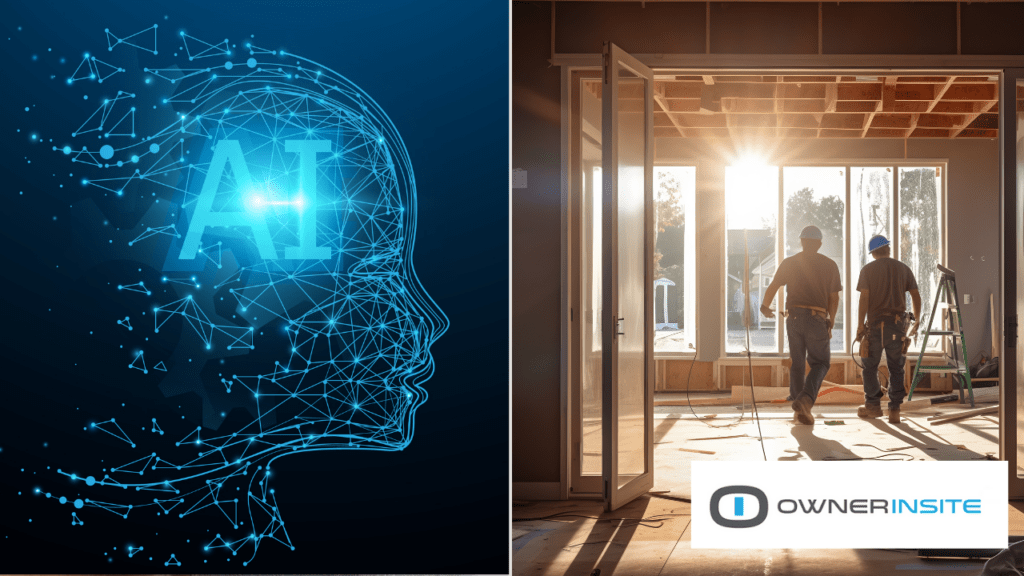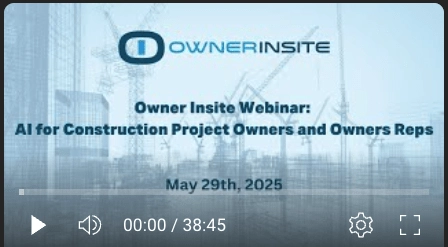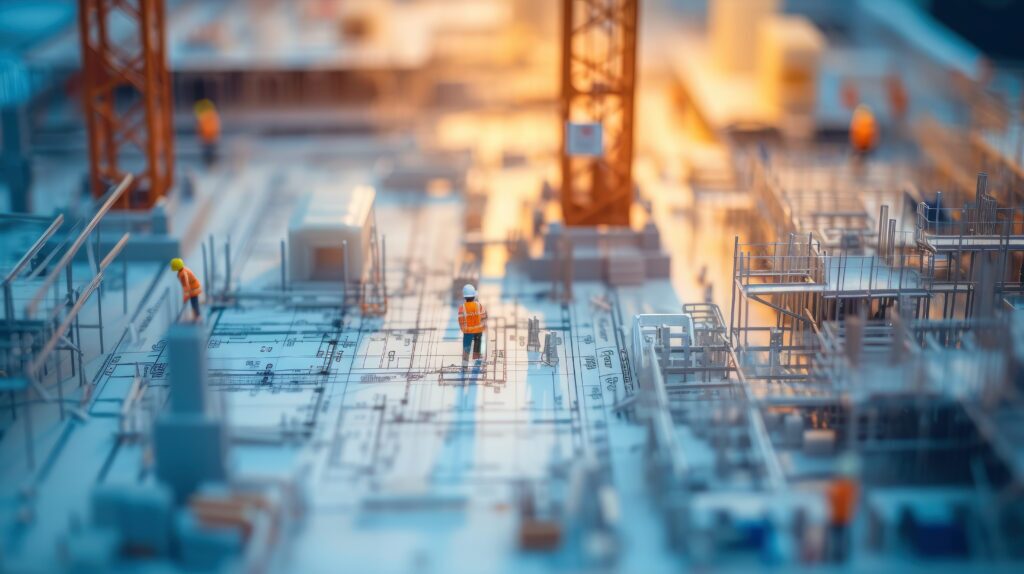AI, or Artificial Intelligence, has become very hard to avoid. There’s another news story about the next big AI tool, platform, or company everywhere you look.
But, like other types of technology like crypto and NFTs, it can be challenging to figure out what’s real and what’s not. So, let’s take a closer look at how AI is being used in construction now and what we can expect to see in the future.
What is AI?
Before we understand what AI can and is doing in the construction industry, it’s essential to understand what it is.
AI might sound like something out of science fiction, but its existence is more of a testament to the growing abilities of human programmers than something you might see on the silver screen.
Artificial intelligence is very advanced computer programs that have been “taught” to differentiate between many times more parameters and questions faster than ever before. It’s still the same if, and, and then functions programmers have used for years, but now we’re programming software to understand when to apply them.
Unlike traditional software, which we need to pre-program with everything we want them to do forever, AI is programmed to “learn” while it completes tasks. So rather than programming an AI platform with everything it will ever need to do, programmers create code that allows the platform to gather information from various sources and then use that information to perform ever more complicated tasks.
In simple terms, AI’s programming teaches it how to learn and apply that learning to solve problems on command.
AI In Construction Design
Sometimes, even architects and engineers can use a little help when designing buildings, and one thing AI is very good at doing is generating new, innovative ideas.
One thing that AI is already capable of doing is developing construction designs that meet a specific set of parameters. The only catch is that you need to be very specific about your parameters, and you will probably first have to teach your AI platform what the local building and design regulations are.
Even if AI’s ideas are only a starting point for construction design, this can save time and effort in brainstorming in the early stages of the design process.
So, instead of relying on AI for your final construction designs, you may use it early in the process to identify a few potential designs that meet all the requirements for that building.
AI can also identify potential design conflicts faster and more accurately than traditional software and the human construction professionals who operate them. So, for instance, an AI-based construction design tool can tell you if your HVAC ducting is too close to another service or if any other conflicts might arise during the project and suggest alternative routing for those services.
So, AI is one of the best new tools for checking construction designs and fixing potential conflicts.
AI In Construction Estimating
Construction estimating is complex, and every project, specification, and design differs. However, certain basic “first principles” still govern everything construction estimators and even construction estimating software do to calculate costs.
In construction, AI can be taught to differentiate between those specifications and designs and to break down material take-offs by first principles before inserting raw material costs, labor rates, and all the other stuff that makes up a complete construction estimate.
AI tools are even being taught to “scrape” pricing off supplier websites, so estimators no longer have to source products and pricing for bids and quotes manually.
AI In Bid Adjudication
Another area where AI might help in the construction world is in bid adjudication.
So far, it’s usually been up to a committee of people to apply complex adjudication criteria, research vendors that have submitted bids, and decide which offer is best based on all factors.
The problem is that when people do these things, it’s tough to get consistent results, and it’s often impossible to keep personal opinions out of the process. But this kind of process is tailor-made for AI.
In the future, we may see construction bids and bid packages entered into AI software programmed with parameters and adjudication criteria and then have that platform accurately and consistently determine the best contender based on those settings.
Taking the human element out of the process will make adjudication faster and more accurate and eliminate the potential for corruption and the possibility that unsuccessful bidders might claim corruption even when none is present. That, in turn, will lessen the likelihood of time-consuming investigations and the inevitable delays they cause.
AI In Construction Scheduling and Planning
Just like AI is excellent at identifying potential conflicts between services during the construction design process, it’s also making strides at creating construction schedules based on specific parameters and at identifying potential conflicts that might arise during the construction process and with related processes like supply chain and procurement, equipment and resource management and so on.
AI can also be trained to update project schedules when delays and conflicts arise during the project.
So, for instance, if you discover that a particular product ordered for the project was incorrectly supplied, AI can revise your project schedules to allow for a replacement to be shipped without losing too much time or productivity.
AI In Closeout and Occupancy
Project closeout is the last and one of the most critical phases of the project. Tracking all the tasks that need to be completed can be complex. From punch list items to warranty information, final invoices, and everything else. It’s a lot to track and maintain. AI technology can help collect all relevant project documents, organize them, and streamline the closeout process. Additionally, Artificial Intelligence can help you identify any documents you may be missing or if you have duplicates of documents. Gone are the days of searching through binders, folders, and computer files!
Similarly, AI technology allows you to quickly find the information you need should you need it post-occupancy. Need to know if that item is still under warranty? Artificial Intelligence tools can help you find the answer and provide all the necessary documentation.
Where Is AI Technology Right Now?
Even though we’re seeing AI everywhere, and it’s all over the news, the truth is this technology is still very much in its infancy, and it will be quite some time before we see the full impact and opportunity it provides.
There are plenty of other issues to resolve between now and then. For instance, there is growing pushback against AI system “learning” by sampling copywritten works of art, scientific studies, and writing, and we’re likely to see more laws and regulations limiting what can be used to teach AI systems.
We’ve also seen more and more stories about AI systems losing accuracy over time. So, for instance, when their calculations were 97% accurate when they were released, that percentage dropped significantly over time.
That seems to be because AI can’t differentiate between correct and incorrect information, so it learns both indiscriminately.
In a way, AI is very much like most kinds of tech in that the people behind it have opted to release an MVP or Minimum Viable Product to market, and they’re working to fix bugs and problems as they appear.
It will be a while before all those issues can be resolved, though; new problems will likely arise even as they are. So, like the early versions of anything, from cars to computers and cell phones, the AI product is likely to look very different in twenty, thirty, or a hundred years.
Can AI Solve Construction Management Problems for Project Owners?
As much as everyone would like AI to solve all our tech, planning, and design problems, the truth is it will be quite some time before all the bugs are worked out. Until then, we should be cautious and not immediately rely on this kind of technology for something as important as construction management.
Construction is a complex industry, and nearly every level and process involved in taking buildings from concept to completion requires human skill, talent, and experience. Until AI can figure out a way to download all the knowledge built up in the industry over decades-long careers and apply it, there’s just no contest. Skilled, experienced people and dependable construction management software are still head and shoulders over the alternatives.
At Owner Insite, as a leader in construction project management for owners, we’re watching this closely because we’d like to offer our clients the best technology for your specific needs.




